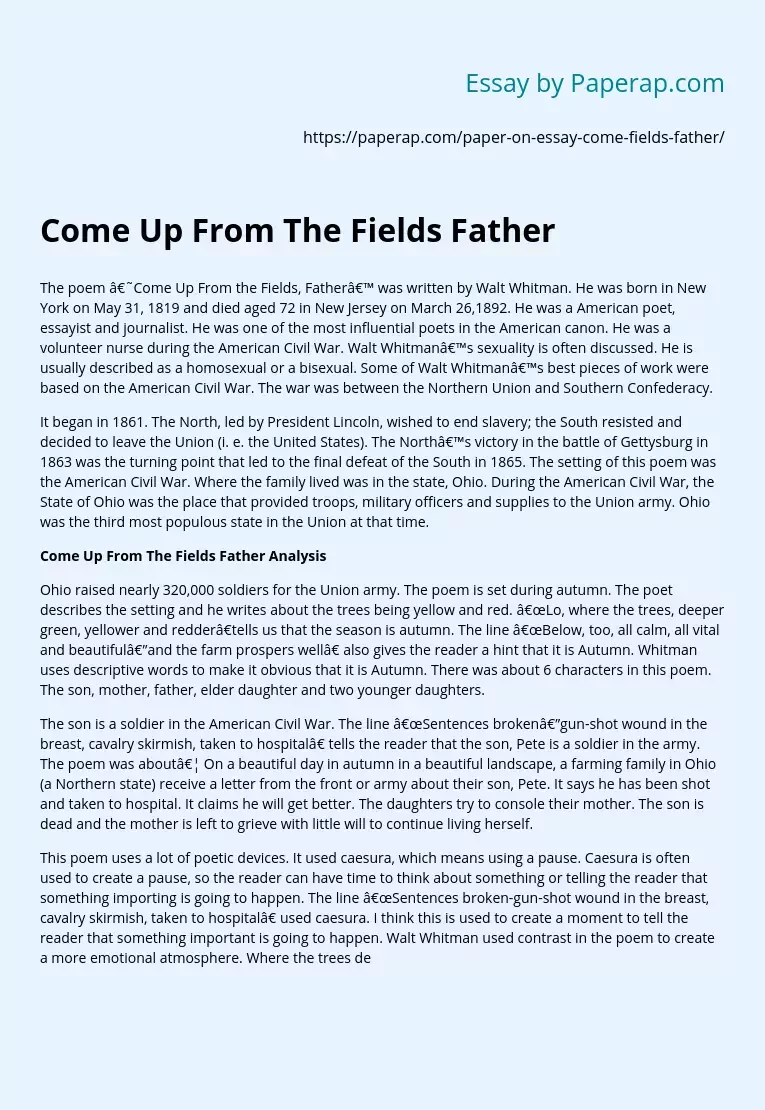Come Up From The Fields Father
The poem ‘Come Up From the Fields, Father’ was written by Walt Whitman. He was born in New York on May 31, 1819 and died aged 72 in New Jersey on March 26,1892. He was a American poet, essayist and journalist. He was one of the most influential poets in the American canon. He was a volunteer nurse during the American Civil War.
Walt Whitman’s sexuality is often discussed. He is usually described as a homosexual or a bisexual. Some of Walt Whitman’s best pieces of work were based on the American Civil War. The war was between the Northern Union and Southern Confederacy.
It began in 1861. The North, led by President Lincoln, wished to end slavery; the South resisted and decided to leave the Union (i. e. the United States). The North’s victory in the battle of Gettysburg in 1863 was the turning point that led to the final defeat of the South in 1865. The setting of this poem was the American Civil War. Where the family lived was in the state, Ohio. During the American Civil War, the State of Ohio was the place that provided troops, military officers and supplies to the Union army. Ohio was the third most populous state in the Union at that time.
Come Up From The Fields Father Analysis
Ohio raised nearly 320,000 soldiers for the Union army. The poem is set during autumn. The poet describes the setting and he writes about the trees being yellow and red. “Lo, where the trees, deeper green, yellower and redder”tells us that the season is autumn.
The line “Below, too, all calm, all vital and beautiful—and the farm prospers well” also gives the reader a hint that it is Autumn. Whitman uses descriptive words to make it obvious that it is Autumn. There was about 6 characters in this poem. The son, mother, father, elder daughter and two younger daughters.
The son is a soldier in the American Civil War. The line “Sentences broken—gun-shot wound in the breast, cavalry skirmish, taken to hospital” tells the reader that the son, Pete is a soldier in the army. The poem was about… On a beautiful day in autumn in a beautiful landscape, a farming family in Ohio (a Northern state) receive a letter from the front or army about their son, Pete. It says he has been shot and taken to hospital. It claims he will get better. The daughters try to console their mother. The son is dead and the mother is left to grieve with little will to continue living herself.
This poem uses a lot of poetic devices. It used caesura, which means using a pause. Caesura is often used to create a pause, so the reader can have time to think about something or telling the reader that something importing is going to happen. The line “Sentences broken-gun-shot wound in the breast, cavalry skirmish, taken to hospital” used caesura. I think this is used to create a moment to tell the reader that something important is going to happen. Walt Whitman used contrast in the poem to create a more emotional atmosphere. Where the trees deeper green, yellower and redder, cool and sweeten Ohio’s villages with leaves fluttering in the moderate wind’ and ‘the sky so calm, so transparent after the rain, and with wondrous clouds, bellow too, all calm, all vital and beautiful, and the farm prospers well’ is used to create a peaceful and calm atmosphere. After the poet creates a clam and peaceful atmosphere, it i shattered by the opening of the letter. The sentences themselves are ‘broken’ and fragmented imitating the nervousness of the mother as she reads the lines, ‘gunshot wound in the breast, calvary skirmish, taken to the hospital’.
The mother jumbles everything together as she tries to make sense of it all. I think that the repetition of the exclamation ‘o’ captures the mother’s fear and disbelief. Her world has been destroyed by the news. Unlike the calmness of the skies and the union of man and nature in the opening stanzas, here the mother i disconnected as the world ‘swims’ and ‘flashes’ before her. The main themes of this poem was anti-war, pain, sorrow felt by family and death. Anti-war is showed by the death of the son in war because Whitman used this to symbolize the death and the bad things about war.
Come Up From The Fields Father. (2019, Dec 05). Retrieved from https://paperap.com/paper-on-essay-come-fields-father/

